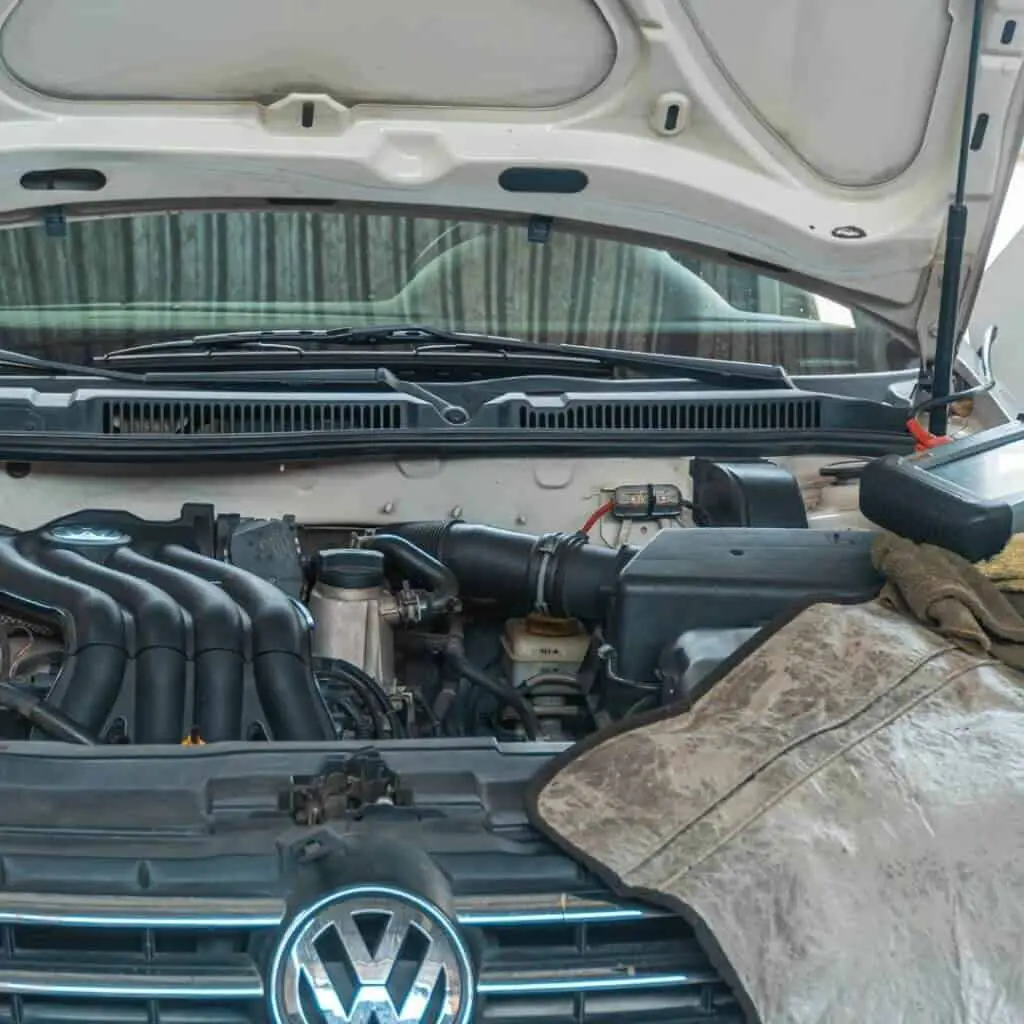Are you familiar with Skoda Yeti problems?
Skoda Yeti is a compact SUV manufactured by Skoda Auto. It offers practicality and versatility for families and outdoor enthusiasts. This is because it is equipped with a distinctive boxy design, raised ride height, and large windows.
The Yeti offers various engine options, including petrol and diesel variants with different displacements. It is available in 1.2-liter or 1.4-liter TSI petrol engines and 1.6-liter or 2.0-liter TDI diesel engines.
Alongside its well-tuned transmission system and advanced technology features, the car delivers a comfortable and smooth ride experience.
The Skoda Yeti has had its share of problems. In this post, we will explore some common issues faced by owners of the Skoda Yeti and provide potential solutions to help address these concerns.
Most Common Skoda Yeti Problems
![]()
- Engine issues
Skoda Yeti owners have reported several common engine issues that require attention. One significant problem involves the 1.2-liter TSI engine, which tends to consume excessive amounts of engine oil.
If left unattended, this issue can lead to engine damage and failure. Owners must regularly check and replenish the engine oil to avoid such consequences.
Another reported concern relates to the timing chain tensioner. Over time, this component can wear out, resulting in a rattling noise and timing issues within the engine.
Turbocharger failure has also been observed in Skoda Yeti engines, particularly those equipped with the 2.0 TDI engine. Symptoms of turbocharger failure include power loss, reduced acceleration, excessive black smoke from the exhaust, and unusual turbocharger noise.
This problem often arises due to inadequate maintenance practices, such as infrequent oil changes. Over time, the turbocharger can accumulate debris or sludge, leading to blockages and eventual failure.
Additionally, insufficient oil levels can result in overheating and damage to the turbocharger.
Malfunctioning wastegates or actuators can also contribute to turbocharger failure by causing excessive spinning speeds. To prevent such issues, it is crucial to strictly adhere to the manufacturer’s maintenance schedule.
This includes regular oil changes and inspections of the turbocharger and wastegate components. [1]
Owners of affected Skoda Yeti models should be aware of these typical engine issues and take prompt action to address them. Regular engine maintenance and inspections are vital in preventing these problems and ensuring the vehicle’s reliability.
- Electrical issues
Skoda Yeti owners have reported electrical with their vehicles. One prevalent concern is the electric windows, which can become stuck in the down position or fail to operate. The culprit behind such issues is often faulty window regulators. These may require replacement for a satisfactory resolution.
Another frequently encountered electrical problem relates to the radio and sound system. Owners have reported unexpected shutdowns or failures to turn on, often resulting from faulty fuses or wiring complications [2].
Moreover, the dashboard instrument cluster has exhibited problems, ranging from failure to display essential information to complete unresponsiveness. Faulty instrument clusters or wiring issues could be at the root of such malfunctions, requiring the expertise of a qualified technician for inspection and repair.
Some Yeti owners have faced challenges with the central locking system and need help locking or unlocking the doors. This results from faulty control modules or wiring problems, which necessitates professional inspection and repairs.
The Skoda Yeti has also reportedly encountered electrical issues concerning its infotainment system. Users have reported screen freezing, Bluetooth connectivity issues, occasional system failure, and complications with parking sensors, headlights, tail lights, and the central locking system [3].
- Suspension and steering issues
Certain Skoda Yeti owners have experienced issues related to the vehicle’s suspension. These problems can manifest as unpleasant clunking or knocking noises when driving over bumps or uneven surfaces.
The root cause is often worn-out suspension components such as struts, shock absorbers, or sway bar links.
Premature wear of the wheel bearings is common in Skoda Yeti vehicles. This issue results in bothersome humming noises and vibrations.
Additionally, owners have encountered power steering issues, including noise or whining sounds when turning the wheel [4].
Power steering problems can arise from various sources, such as low power steering fluid levels, faulty power steering pumps, or other underlying issues. There have been instances where owners have reported steering rack leaks or looseness, which can potentially lead to a loss of steering control.
Some drivers have faced power steering system problems, such as the illumination of the warning light and the failure of power steering assistance. These particular issues can often be traced back to a faulty power steering control module, which may necessitate replacement.
- Clutch Problems
Frequently reported clutch-related issues include a slipping clutch, difficulty shifting gears, and a heavy clutch pedal. These problems can arise due to worn clutch plates or hydraulic system failures.
To effectively address these concerns, it is advisable to seek the expertise of a trained technician who can conduct a thorough inspection. Their expertise will help accurately diagnose the root cause of the problem.
This may involve replacing the clutch components or repairing the hydraulic system to restore optimal performance.
- Air Conditioning Problems
Skoda Yeti owners have reported various issues with the air conditioning system. These problems include inadequate cooling, strange noises, and even complete system failure. Potential causes of these issues encompass refrigerant leaks, compressor malfunctions, condenser problems, and electrical issues [5].
To guarantee optimal performance of the air conditioning system. It is crucial to arrange timely inspections and repairs with a qualified technician.
By addressing these concerns promptly, the air conditioning system can be restored to its optimal working condition for a pleasant and comfortable driving experience.
- Faulty Fuel Injectors
Skoda Yeti owners, especially those with diesel engines, may encounter occasional fuel injector issues. These problems can arise due to poor fuel quality, inadequate maintenance, or driving with low fuel levels.
Signs of fuel injector failure include rough idling, decreased power, increased fuel consumption, and engine misfires. Fortunately, these issues can often be addressed by cleaning or replacing the fuel injectors.
It is crucial to prioritize using high-quality fuel, adhere to the recommended maintenance schedule, and promptly address any suspected fuel injector problems. These measures can restore fuel distribution and enhance engine performance [6].
- Premature Brake Wear
Skoda Yeti owners have raised concerns about premature brake wear, encompassing uneven and excessive wear on brake pads and rotors. This issue can be attributed to improper driving habits, low-quality braking components, or malfunctioning brake calipers.
To mitigate these problems proactively, conduct regular inspections and maintenance on the braking system. This approach allows for the timely identification and resolution of potential issues, ensuring optimal performance and longevity of the system.
- High-Pressure Fuel Pump Failure
The Skoda Yeti equipped with the 2.0 TDI engine has encountered a problem with high-pressure fuel pump failure. This issue can arise from various factors, including manufacturing defects, poor fuel quality, or insufficient maintenance.
Indications of this problem include rough idling, power loss, and engine stalling. To safeguard the engine and avoid exacerbating the issue, it is imperative to promptly diagnose and address the problem through timely repairs [7].
Regular maintenance is crucial in preventing complications with the high-pressure fuel pump and ensuring an extended lifespan for the engine.
This includes adhering to recommended intervals for fuel filter replacement, as it aids in preserving the fuel pump’s functionality and overall engine performance.
Fixing Skoda Yeti Problems

Taking proactive measures to address potential issues with the Skoda Yeti is highly recommended. First and foremost, diligently adhering to the manufacturer’s recommended maintenance schedule is paramount. This dedicated approach allows for the prompt identification and resolution of problems early, thereby preventing further damage.
It is crucial to seek the expertise of a qualified mechanic or visit an authorized Skoda service center for an accurate diagnosis and appropriate repairs. By consulting professionals, you can ensure that any underlying issues are correctly identified and addressed, which will give you peace of mind.
It is also important to prioritize using authentic Skoda parts and components. The use of genuine parts guarantees a perfect fit and optimal functionality within the vehicle and significantly reduces the likelihood of recurring problems.
Moreover, adopting smooth driving techniques plays a pivotal role in extending the longevity of various components.
Read Next: Jeep Renegade Problems
Conclusion
The Skoda Yeti is a highly appealing compact SUV boasting a captivating combination of elegance and efficiency. While this vehicle exudes overall reliability, it is important to acknowledge that the Skoda Yeti has been associated with recurring problems.
Owners must uphold a delightful ownership experience by taking appropriate measures to maintain their vehicles. By implementing diligent care and adhering to regular maintenance practices, the Skoda Yeti can effortlessly surpass the 200,000-kilometer mark.
To ensure the longevity of this remarkable vehicle, owners should dutifully adhere to the manufacturer’s recommended maintenance schedule, promptly address any emerging issues, and opt for high-quality parts for replacements.
Read Also: VW 4Motion Problems





